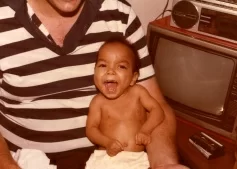 without a thought on my part. But Luke came to my mind yesterday and I looked up some information on him and discovered that his birthday had just passed. I found this old article that I wrote about Luke a few years ago. I thought I'd share it again. I am convinced that there are important and significant lessons we can learn from his life, and that I need to regularly share what I think they are. I hope you enjoy this!
without a thought on my part. But Luke came to my mind yesterday and I looked up some information on him and discovered that his birthday had just passed. I found this old article that I wrote about Luke a few years ago. I thought I'd share it again. I am convinced that there are important and significant lessons we can learn from his life, and that I need to regularly share what I think they are. I hope you enjoy this!The mysteries of God are a part of the Christian life that can often lead to confusion, doubt and even discouragement for believers.
- For some, it's a pride thing. We want to have answers – we want to understand, to be able to grasp the complexities of Biblical truth and God's plan for mankind.
- For some, God's mysteries – the unexplained things of life – are stumbling blocks to faith:
1. Why do bad things happen to good people?
2. Why does He allow pain, suffering and evil to thrive in our world?
Several months ago we were witnesses to the aftermath of the tragedy in Pennsylvania involving the Amish community, where, good, decent, hard working, non violent people were subjected to unspeakable cruelty towards their children. How can this happen?
3. One of our CSC children, who grew up in the worst poverty imaginable in Cebu City, was adopted into a family in the United States several years ago. Well meaning people would tell her how lucky she was and how God obviously had a wonderful plan for her life. She had a hard time with that and would sometimes ask her parents, "But what about all the kids who are still there, who weren't adopted, and who are still suffering and dying? What is God's wonderful plan for their lives? Why me and not them?
For many of us, we celebrate the goodness of God in our lives, we praise him for his healing, for material comforts, for blessing our efforts – even as we observe people who remain sick or disabled, who suffer in poverty – those who efforts and initiatives end in disappointment and ruin.
There are two extremes in terms of people's reactions to the things about God and life that are not understood.
1. There are those who try in vain to grasp the ungraspable – to be able to reduce the mysteries to understandable formulas or explanations. I remember a young seminarian who came to Cebu and who filled the pulpit of our church on a Sunday evening. He preached for an hour on the "peace of God that passes all understanding." Perhaps he felt that if he preached long enough he could crack that nut and open our understanding!
We all know those who have reduced the book of Revelation to precise charts and timetables, giving us easy to understand categories for all of human history and, most especially, the times to come.
2. A second category are those who shake their heads and say, "We'll only know these answers when we get to heaven." They suspend inquiry, not bothering to seek answers to the perplexing questions of life.
Living and working in a Third World country like the Philippines brings some of these mysteries to the front of our lives. Poverty, and all that goes with it, is "in your face." People often ask me "How do you like living in the Philippines?" That's a tough one to answer. Life anywhere has its highs and lows. Some days are great, others are difficult. I often answer this way:
1. When I'm sitting down to a nice breakfast I am aware that, within a few meters of my house are families that have no breakfast.
2. When I'm driving to the office or the Shelter I often pass people walking along the road who, for lack of a few cents can not even afford public transportation and must walk.
3. When I stop to buy medicine for my family or the CSC kids, there are people standing nearby whose children are dying for lack of that very same medicine.
Why am I blessed and they are not?
I recall a conversation with a missionary a few days after Cebu was hit by a strong typhoon. Many of our CSC workers lost their roofs or their entire homes. The houses of the poor were devastated by the high winds and torrential rains. The missionary said that it had been such a miracle how God spared the missionary homes from damage, holding his hands of protection around us during the storm. I remember wondering whether it wasn't more a matter of our having cement houses and strong metal roofs.
Why did our CSC kids have to suffer so much? And how much more, those who live on the street and cannot be admitted to CSC?
These are tough questions. When it comes to trying to understand our own suffering, the Bible gives some answers. For example, Romans 5:3-4 tells us that suffering produces perseverance, perseverance character, and character, hope. And the Bible gives us additional hope that we will someday come to see God's purpose and mysteries:
"But now we see through a glass dimly, but then face to face."
And we hear the testimonies of Christian brothers and sisters who have lived through terrible times and have turned negatives into positives in their lives.
Several months ago I was attending a conference in Bismark, North Dakota. One of the featured speakers was Steve Saint, Steve's father, Nate Saint, was one of the five missionaries killed in 1956 by Aucan warriors in Equador. Steve told about what that tragic day meant to his family, and what it was like when his dad, his hero, didn't come home that day. We saw video of his current family life, and saw a man who was interacting with Steve's children, and who was being referred to as "Uncle." It turns out that this was the very man who had killed Steve's father, who had come to know Jesus and had experienced the forgiveness of God and of the Saint family and now was a part of their family – an amazing story of how good things had come out of tragedy and suffering.
So the clear message is that God has a plan for our lives, we will discover that plan in the right time. He is writing our life's stories, but some of the chapters are difficult ones.
We can understand this. We can, when aided by the Holy Spirit, see how difficulties and suffering are part of a purification process for us, and that we, like Job, will eventually be better people for it.
But what about people who, because of major disabilities, are unable to understand their situation, unable to discern the hand of God or his plan for their lives. Where is the purification and growth and ultimate value for these people? What could God's purpose possibly be?
Back on 1982 a baby was born in a charity ward in a small hospital in Cebu City. 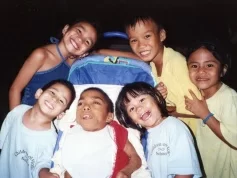 The baby underwent cardiac arrest during birth and was without oxygen for an extended time. Unlike many cases of charity patients, the hospital staff decided to resuscitate the baby, even after he had suffered massive brain damage and cerebral palsy. The baby's mother abandoned him in the hospital, and after a couple months Luke was referred to CSC. When we took him in he appeared to be a bouncing baby boy. We did not know that he would not develop physically beyond about a year and a half, or mentally beyond a few months. Luke would never speak, nor have voluntary movement of his arms or legs.
The baby underwent cardiac arrest during birth and was without oxygen for an extended time. Unlike many cases of charity patients, the hospital staff decided to resuscitate the baby, even after he had suffered massive brain damage and cerebral palsy. The baby's mother abandoned him in the hospital, and after a couple months Luke was referred to CSC. When we took him in he appeared to be a bouncing baby boy. We did not know that he would not develop physically beyond about a year and a half, or mentally beyond a few months. Luke would never speak, nor have voluntary movement of his arms or legs.
Luke became a fixture at CSC. For over 23 years he was an integral part of our lives and a symbol of CSC and what we are all about.
Many times Luke would be hospitalized – often due to upper respiratory infections. He fought for his life many times. There were at least a dozen times when we were sure that he would die. The doctors had told us that he wouldn't make it past five years old. Then they revised it to nine, then 11 – certainly he wouldn't reach his teenage years.
One time, when Luke was critically ill our staff met to pray and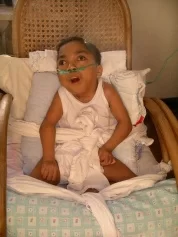 I asked them to reflect on his life. Here is why: I believe that God had a purpose for Luke's life when he created him. I believe that He uses people like Luke to teach us important things. But here is the rub: If we don't spend time reflecting on these lessons, then Luke's life is useless. Its up to us to allow God to make sense of Luke's life.
I asked them to reflect on his life. Here is why: I believe that God had a purpose for Luke's life when he created him. I believe that He uses people like Luke to teach us important things. But here is the rub: If we don't spend time reflecting on these lessons, then Luke's life is useless. Its up to us to allow God to make sense of Luke's life.
And what are the lessons that we found? What has God taught us through his life?
1. First, life is precious. Even though he had nothing to live for, from the world's point of view, Luke clung to live almost ferociously. Some of us who have much more to live for take life casually, we take life for granted. Not Luke. Every day was a struggle. Every breath had to be fought for. Life is a gift from God and we should treat it carefully.
2. God has provided us with opportunities, through Luke's life, to minister to him in significant and life-saving ways. He has provided an avenue for us to live out the biblical mandate to minister unto the "least of these," because, truly, Luke was in that category. Hundreds of people have been given a blessing to participate in the support of CSC that reaches out to children like Luke and many others with other special needs.
3. In so doing, He has given us a chance to show others a Godly value system that doesn't reserve love and attention for those who have something to give back, or who have "potential" or a bright future. For many people who live in a developing country, where resources are limited, this has been a difficult lesson to learn. How could we justify spending so much money for Luke's hospitalization when other, "normal" kids needed care? Luke's life gave us the opportunity to teach about the value of life and about how God looks at all of us.
4. Luke has been a tremendous ambassador for CSC. People around the world remember observing the loving care that he received by our staff and workers. They remember his famous smiles. They may quickly forget the names of the staff or other children, but they remember Luke. "How's Luke doing?" we get asked wherever we go to talk about the ministry of CSC. And our care of Luke helps us explain the true nature and core values of our work in the Philippines.
5. Luke has been a safety valve for those that had an opportunity to know him. My job as Field Director of CSC involves lots of administrative chores, like making budgets, government relations and various kinds of problem solving. There are days when I get stressed out and start to feel the weight of the world on my shoulders. But all I needed to do is to drive a few short miles to where Luke lived, to hold him in my arms, and I get a clear picture of what real struggles are all about. My struggles paled in comparison to what Luke faced every day. Self pity may be easy for some people, but those that knew Luke have no excuse for feeling sorry for themselves. What a great gift that was to all of us.
A little over a week before we left Cebu, Marlys called me on my cell phone and told me that I should get to the hospital quickly, as Luke wasn't doing well. He had been hospitalized for over a week and his breathing was bad. I had gotten messages similar to this one throughout Luke's life, so I went to the office and took care of a few things. But the Lord laid it on my heart to go see Luke and when I entered his room his breathing was extremely labored. He looked different than I had ever seen him, and it became clear that he was dying. I sat down next to him, kissed him and looked into his eyes. For 23 years we had loved this boy. It wasn't easy to say goodbye. I said to him, "Luke. You can go. Go to be with Jesus, Luke. I love you." Within a couple of minutes Luke took his last breath. 23 years of pain, suffering, limitations, hospitalizations, forced breathing, skin rashes and infections were over. We would never see Luke's smile again.
As Luke was dying in that hospital room, I made a promise. I'm not sure if I was making a promise to Luke, to God or to myself. But I decided then and there that I was going to talk about Luke on our coming furlough. I believed then and do now, that the church of Jesus Christ needs to hear about Luke, that the lessons of his life are important ones. Many Americans are complainers - full of self pity. People who have so many material comforts are unsatisfied. American discourse is increasingly a chorus of victim and entitlement claims. Charles Sykes, in his book "A Nation of Victims: The Decay of the American Character" states that, "in a nation where everyone is a victim, no one is a victim." In our preoccupation with our own needs we have a hard time seeing the needs of others – people like Luke.
In his song "God Help the Outcasts," the Hunchback of Notre Dame poses several difficult issues:
I don't know if there's a reason
Why some are blessed, some not
Why the few You seem to favor
They fear us, flee us,
Try not to see us.
The first part we have already examined. The second is our call to arms. "Why the few You seem to favor, they fear us, flee us, try not to see us."
I don't know what factors might make it difficult for us to see the needs of society's outcasts. Perhaps we are too busy. Maybe our personal and church calendars are so full that there just isn't room for Luke, or the man who had fallen to thieves at the side of the road, to break into our day. Maybe we are numbed or fatigued by the needs of others, or simply overwhelmed by the circumstances of our own lives. Maybe we have become cynical. "Why did that guy travel this road at this time carrying that amount of money? He deserves what he got!"
Maybe, just maybe, Luke can help cut through the apathy, the self-centeredness and cynicism of our lives. He was a person with significant needs that he didn't cause. He was totally dependent on others to live. His life had none of the possibilities and opportunities that we take for granted every day. He needed us so very much. Maybe Luke can serve as a symbol of many others that we come into contact with. Maybe Luke can help us rescue our lives.
The Three Grandmas
Well, we are fully operational! Up and running, full steam ahead as last week started a new school year at Cebu Children of Hope School. Fifty-one eager students showed up in the parking lot on Monday raring to go and we have had a very good start. The kids are excited about a lot of things: new school shoes, moving to a new class and teacher, reading new stories, new folders and notebooks. The teachers spent two weeks preparing for the new year before the kids even arrived. But the hottest news around school is all the new curriculum materials we have.
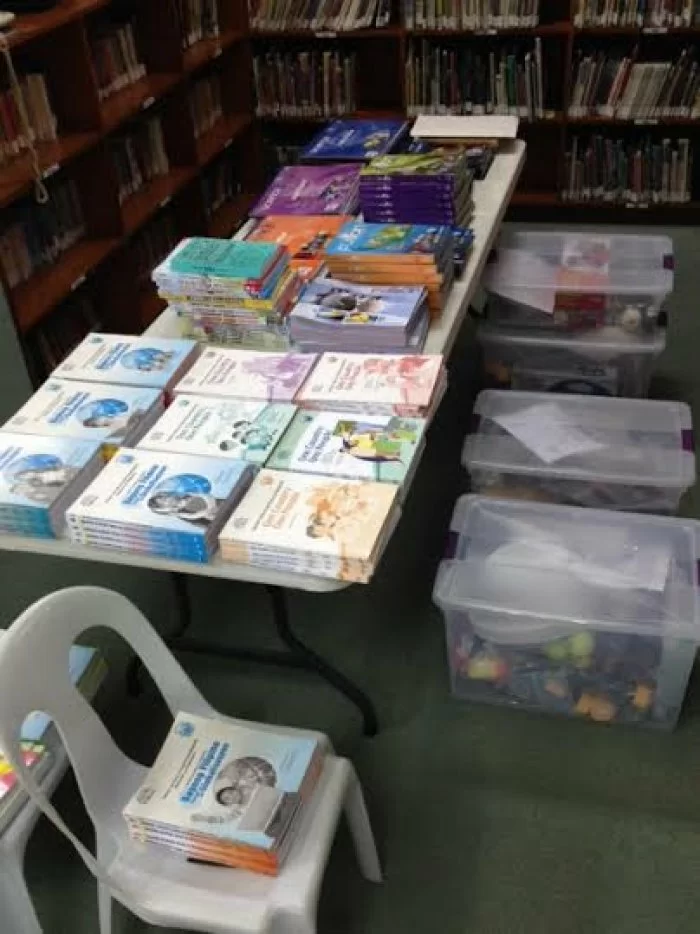 This doesn’t
sound very glamorous, but it really is a big deal and a little bit miraculous. We, the school staff and kids, have
affectionately dubbed the three people who made the purchase of new science,
civics, Filipino and Bible materials possible, The Three Grandmas. Three wonderful ladies heard about our need
for a bunch of new curricula and they graciously provided all of the funds for
the materials! Wow!
This doesn’t
sound very glamorous, but it really is a big deal and a little bit miraculous. We, the school staff and kids, have
affectionately dubbed the three people who made the purchase of new science,
civics, Filipino and Bible materials possible, The Three Grandmas. Three wonderful ladies heard about our need
for a bunch of new curricula and they graciously provided all of the funds for
the materials! Wow!
For the first time in school history (18 years) we have a full formal elementary science curriculum. We are in seventh heaven.
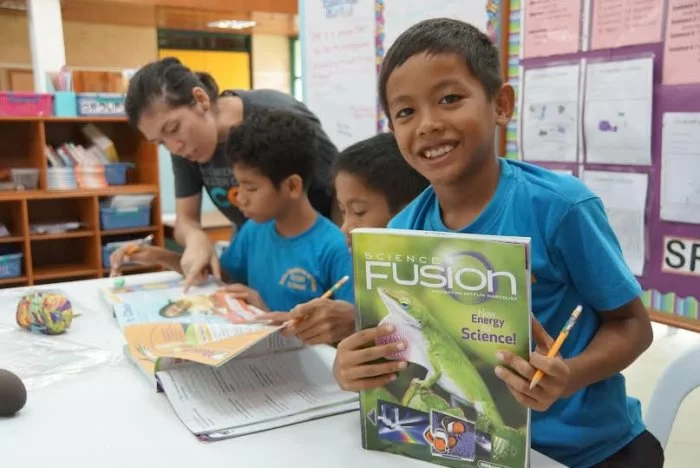
 The Philippine
Department of Education issued new Filipino and civics curricula in the last
couple of years which we had been hoping to purchase and now we have it all!
The Philippine
Department of Education issued new Filipino and civics curricula in the last
couple of years which we had been hoping to purchase and now we have it all!
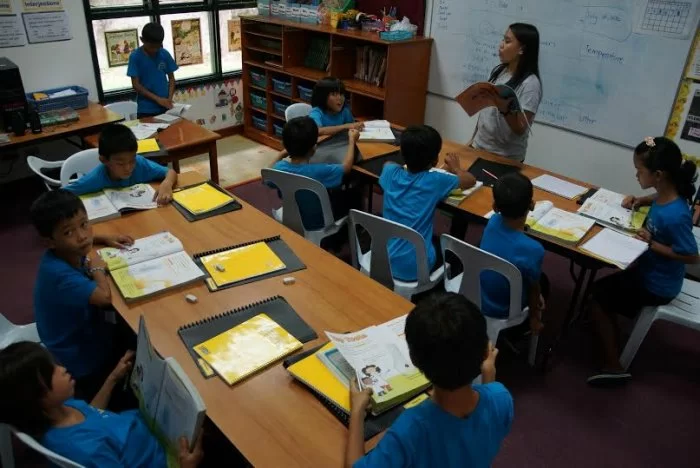 We also added
a few more Bible materials to update and beef up our resources for Bible
classes.
We also added
a few more Bible materials to update and beef up our resources for Bible
classes.
What a wonderful, unexpected blessing to get all of this new material in one fell swoop. We can’t thank The Three Grandmas enough. Each day when the kids use the new books and experiment equipment, we’ll be reminded of these three ladies' generosity and God’s provision through them.
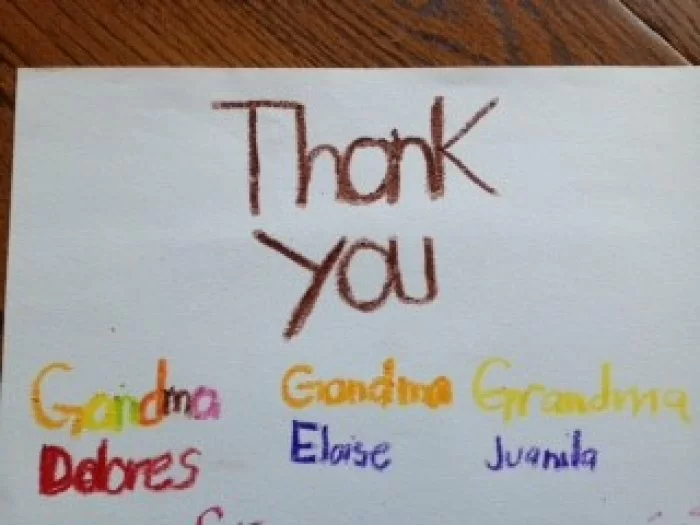

Airports
Airports have played a significant role in my life and the life of CSC. I was thinking of that the other day when I was sitting in the Cebu airport waiting to catch a plane that would lead me to another plane and another airport, which would get me home to be a part of my dad's memorial service. Sitting there and thinking, wondering what the next few days would hold. I've done a lot of deep thinking in airports. Once I get on the plane it is pure misery, as they are not made for people my height. But airport chairs, while not being luxurious, are okay for sitting and thinking.
I've been in many, many airports in my lifetime, as many as 75. Several of them are in the Philippines. I have spent the most time in the Cebu and Manila airports, waiting for flights to attend matching meetings or meeting to address problems with ICAB, or getting ready to go home to Cebu and report to the staff. Since most Philippine Airlines flights out of Manila are late in leaving, there has been much time to think and reflect on things. Sometimes my thoughts were discouraging ones, my having been disappointed with the outcome of matching conferences or meetings with officials. Other times they were joyous thoughts, and I couldn’t wait to get back to Cebu to share the outcomes with the rest of the staff.

I can remember several times when I needed to make a quick trip to the US to be with my family when my dad had a bad accident, or when he eventually passed away. Airports can be sad places for missionaries in these situations, wondering what it will be like to get home and join a grieving family or to visit someone who recently had to go into a nursing home. I have experienced a lot of heavy thinking in airports around the world.
But there have been lighter times, and joyous ones. I remember times when Marlys and I were traveling to visit former CSC kids in their adoptive families, or going to visit supporting churches with good news about what God was doing at CSC. I remember traveling to different parts of the Philippines, to some of the dinkiest airports that you could imagine, checking up on referrals of children, or, in the days before we had a social worker, to do case management work. Often, those airport visits were far more enjoyable, and thoughts were expectant rather than worrisome.
And for every hour spent waiting to take a flight there was one at the Cebu airport waiting for an arrival. Hundreds of hours have been spent waiting for adoptive parents, family, staff, board members and other visitors. While waiting our thoughts would be all over the map. Would they like Cebu? Would they be good adoptive parents for our child? Would they fit in on our staff? Would they ever arrive?
On the whole, I have not enjoyed sitting and waiting in airports. But those airports, and the planes that they service, have allowed us to go and do the work that God called us to do for the children of CSC. For them, every waiting hour has been worth it.
We love you, Big Jer
A dear man left this world on Sunday. It was Father's Day.
Dr. Gerald Healy, who most people lovingly called "Big Jer" was the father of Paul Healy, our Field Director and co-founder. But to CSC, Big Jer was a lot more than that. He had the back of CSC in the States in so many ways while the ministry began and then flourished in the Philippines. He was a board member, a fundraiser and an incredible advocate.
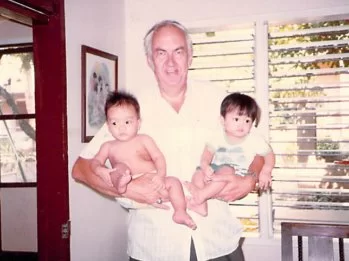
I'll never forget the first time I saw Jer. It was one of my early introductions to CSC and happened just before joining the staff. Jer was emceeing the annual banquet--a role he filled for decades. My wife, Theresa, and I attended the banquet and sat in the last row of tables like all the other late RSVP'ers. We were touched by the stories of life change and amazed when they announced how many people had visited Cebu and seemingly half the room stood up, but what stood out more than anything was how funny the emcee was. He was knee-slapping funny. I even turned to Theresa at one point and said, "This guy is awesome!"
Years later, and having gotten to know Jer on a personal level, I can tell you the description fit. Jer was awesome. His kindness and wit were extraordinary. In all the times I saw Jer, I can't remember one in which I didn't leave it feeling encouraged, entertained and better than I was before it. What a class act and generous spirit.
One time, Jer and I were sitting at lunch at a golf course. We hadn't played that day, but Jer had the day before. He was telling me about the foursome he played in, and how he and a friend of his had been paired up with a couple of young guys. I remember Jer telling me these guys had it together. They were smart, funny and impressive. It was also evident they weren't Christians. Jer paused at that point and said, "Matt, these guys would make great Christians." Jer wanted them to know what he knew. He wanted them to have the hope of Jesus Christ. He could imagine them in the church, and he had tried to be a light to them that day.
I think of that interaction now and smile. The guy I was sitting across the table from made a great Christian himself. We could use hundreds more like him in our churches, but there was only one Big Jer. He was loved in his family, in the halls of Bethel college and in sanctuaries and fellowship halls across Minnesota. And, he was sure loved at CSC.
Precious memories
The other day I was attending a seminar sponsored by the International Justice Mission. While waiting for the session to start I was surprised to hear someone call my name. It was a young lady whose face was familiar but whose name I could not retrieve. After a few minutes I realized that she was from Bulacao, where we first started our ministry, and part of one of the first families that we came to know and help there. She was so warm and friendly, and talked about those days in Bulacao. She remembered all the staff members from those days. Then she said something that brought tears to my eyes. She said, "I found Jesus through your ministry." She remembered how we started a Bible study in our home for neighbors and acquaintances in the neighborhood, and how we offered assistance to families who were struggling. Since she was one of 11 children in her family, we had reached out to them with various types of help, and we invited the kids to come to Bible School in our mission home. She recalled how we sponsored her and her siblings to go to camp, and how it was there that she accepted Jesus as her personal Saviour. What a blessing to hear her pour out memories and thanksgiving. She told how most of her family are Christians, and one brother is a pastor. She is married to a pastor and is employed as a social worker with IJM. We certainly cannot claim any responsibility for her successes in school and professionally, or for her conversion to Christ. That was the result of her parents' hard work and sacrifice and the work of the Holy Spirit in their lives. But it was fun to hear how our efforts 37 years ago are appreciated and meant a lot to this family. Thanks to God for directing our steps for these years and bringing people into our lives that needed what we had to give.
The long road that led to CSC
How can people be so heartless?
How can people be so cruel?
Easy to be hard, easy to be cold
How can people have no feelings?
How can they ignore their friends?
Easy to be proud, easy to say no.
Songwriters: Ragni, Gerome / Rado, James / Mac Dermot, Galt
The words of this song from the late 60s were brought to mind recently when a 12 year-old boy was referred to us. His story reveals the heartlessness and cruelty of people, and the ways that some children have to suffer at their hands. We'll call this boy Roberto and his younger brother, Michael.
Roberto and Michael were brought to an orphanage in Cebu City when they were babies. The orphanage, which was connected to a Protestant church, was not a good place. When the boys were older they were abused. Punishment was severe, sometimes cruel. The lady who was in charge of the place was the one dealing out the beatings. Luckily, the place was closed down and the children were parceled out to other child caring institutions. CSC got three girls from that place, but we did not have room for boys at the time, so Roberto and his brother, then nine and 10, went to live at a home for children on a neighboring island. Shortly after there arrival there, one of the boys threatened Roberto. (The home catered to older kids, and their residents included some who had lived on the streets and were used to fighting and intimidation.) On the second night they were there, Roberto decided to run away. Michael was afraid to go out into the dark night, but Roberto was able to find a young boy, just five years old, to go with him. The gate was always left open so they had no trouble getting away.
Roberto only knew one place to go, back to the church where he had lived. He didn't know that it was 18 miles from where they were starting out. And they had to cross a long bridge that led to Cebu island. But he knew he wanted to leave that place, so off they went into the night.
 It took two days and nights to get to the church. They slept
along the road, wherever they could find a spot that looked safe. On the second
morning Roberto woke up and discovered that his little companion was gone.
Without a trace. All he could do was keep going. When he finally got to the
church he found that it was closed up. The gate was locked. One of the former
orphanage workers said that he could be their family's houseboy, but that didn't
last for long. One day that family packed up and left, and Roberto had no place
to go.
It took two days and nights to get to the church. They slept
along the road, wherever they could find a spot that looked safe. On the second
morning Roberto woke up and discovered that his little companion was gone.
Without a trace. All he could do was keep going. When he finally got to the
church he found that it was closed up. The gate was locked. One of the former
orphanage workers said that he could be their family's houseboy, but that didn't
last for long. One day that family packed up and left, and Roberto had no place
to go.
Out of desperation, he found a big piece of cardboard which
became his bed for the 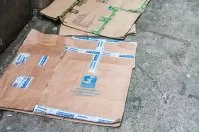 next months. He slept just outside the locked gate of
the former church/orphanage. He would look for food wherever
he could find it, in garbage cans or occasional handouts from neighbors. Other
times he would steal food to feed his hungry stomach, which enraged people in
the community. He was often beaten by neighborhood boys. One family took pity
on him and would stop the boys from beating him, and would give him food. Life
was hard for Roberto. No place to live. Nobody to take him in. He missed his
brother and worried about the boy who had disappeared along the way. How can
people be so heartless? How can they be so cruel?
next months. He slept just outside the locked gate of
the former church/orphanage. He would look for food wherever
he could find it, in garbage cans or occasional handouts from neighbors. Other
times he would steal food to feed his hungry stomach, which enraged people in
the community. He was often beaten by neighborhood boys. One family took pity
on him and would stop the boys from beating him, and would give him food. Life
was hard for Roberto. No place to live. Nobody to take him in. He missed his
brother and worried about the boy who had disappeared along the way. How can
people be so heartless? How can they be so cruel?
One of the compassionate neighbors knew about CSC and informed us about the situation of Roberto. We get lots of referrals and can not respond immediately to all of them. Eventually our social worker and counselor went to visit Roberto and hear his story. They were overwhelmed by the things that had happened to him. In the next few days we made contact with the place where Michael was staying and arranged a meeting with their social worker. Two of our social workers, Chris and our new Social Worker Director, Klaris, and our counselor, Eldie, made the trip to the neighboring island to discuss the boys' case. Michael was relieved to hear that Roberto was okay. He hadn't heard anything about him for a year and a half. Both boys wanted to be reunited and it was determined that this should happen the next day at CSC.
 The reunion was so sweet for the boys. They were more than a
little amazed at the facilities of CSC and the course of events that had
brought them back together. After more counseling and some medical
tests, and a talk with a representative of the place where Michael was living,
our staff made the decision to admit Michael and Roberto. The boys would no
longer be separated and Roberto's days of homelessness would end. It was an
exciting day for all of us. They boys needed to go back to their respective
places, get the few things they owned, and say goodbye before becoming official
CSC kids. But first we brought them to Jollibee, a fast food restaurant near
CSC. It was so much fun to watch the boys eat and laugh. It must have seemed a
little surreal to them to be together at that place with a group of adults who
were concerned about them and wanted them to be together in a nice and safe place.
Roberto was not able to finish his chicken and we were surprised when he asked
if he could have a bag for "take-home."
The reunion was so sweet for the boys. They were more than a
little amazed at the facilities of CSC and the course of events that had
brought them back together. After more counseling and some medical
tests, and a talk with a representative of the place where Michael was living,
our staff made the decision to admit Michael and Roberto. The boys would no
longer be separated and Roberto's days of homelessness would end. It was an
exciting day for all of us. They boys needed to go back to their respective
places, get the few things they owned, and say goodbye before becoming official
CSC kids. But first we brought them to Jollibee, a fast food restaurant near
CSC. It was so much fun to watch the boys eat and laugh. It must have seemed a
little surreal to them to be together at that place with a group of adults who
were concerned about them and wanted them to be together in a nice and safe place.
Roberto was not able to finish his chicken and we were surprised when he asked
if he could have a bag for "take-home."
When they got to the place where Roberto had been staying, he ran to one of the houses near the church, the place where one of the people who had protected him from the cruel boys lived. This was the first person who had shown concern for him, maybe in his whole life. Roberto wanted to give this guy the leftover chicken from Jollibee! It was one of the most touching things that we have known about in our many years of working with kids. A few acts of kindness had made a huge difference in Roberto's life and he wanted to say "thank you" in the only way he knew how.
Later that day the boys were
officially admitted, and spent the night in the infirmary while  we waited for
their lab results. The next morning they moved into the Cherne Home, where
house parents Tarex and Pureza and the children welcomed them. It was the
biggest day in their lives, so far. And there are many big days ahead. They
will be making a lot of new friends and will soon be enrolled in our Children
of Hope School. They won't be apart. They won't be hungry. If they are sick
they will be provided with the best medical care available in the Philippines.
If they are sad they'll be comforted. And they will get the chance to learn
about a loving Heavenly Father and a friend and Savior who will never abandon
them.
we waited for
their lab results. The next morning they moved into the Cherne Home, where
house parents Tarex and Pureza and the children welcomed them. It was the
biggest day in their lives, so far. And there are many big days ahead. They
will be making a lot of new friends and will soon be enrolled in our Children
of Hope School. They won't be apart. They won't be hungry. If they are sick
they will be provided with the best medical care available in the Philippines.
If they are sad they'll be comforted. And they will get the chance to learn
about a loving Heavenly Father and a friend and Savior who will never abandon
them.
Yes, its easy to be heartless. Easy to be cruel. But its also easy to be kind. Easy to be a needed friend. Kids need a friend. Thanks to all who make it possible for us to say yes to kids like these two and the many others who need the love and care of our Shelter.





